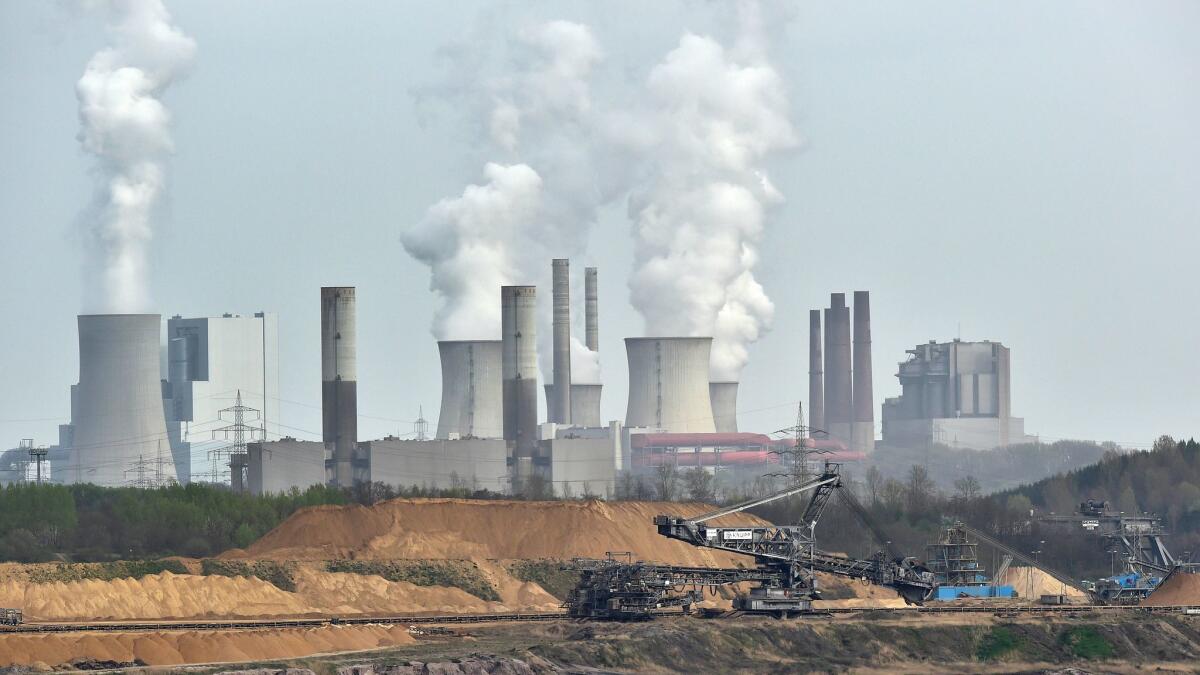U.S. economic growth and security outweigh climate policy review, envoy tells U.N. conference

- Share via
Reporting from BERLIN — The Trump administration will stay focused on economic growth and national security no matter the outcome of its climate change policy review, a U.S. official told delegates at a United Nations convention in Germany on Saturday.
“It is clear that the administration will not take actions that are contrary to the overarching focus of competitiveness and economic growth,” said Trigg Talley, a deputy special envoy for climate change at the State Department.
Talley led an unusually small U.S. delegation of seven officials to the 10-day U.N. Framework Convention on Climate Change talks in Bonn. The conference was held to start designing rules for implementing the Paris accord to limit average global warming to 2 degrees Celsius above preindustrial levels.
Reflecting the shift in its government’s views on climate change after President Trump’s inauguration in January, the U.S. delegation was far smaller than the 44-member contingent sent to Bonn for similar talks a year ago. The previous U.S. government led by Barack Obama played a leading role in achieving the 2015 Paris agreement.
Talley dodged the most pressing question at the gathering: Will the United States remain committed to the Paris accord despite Trump’s campaign vows to cancel it?
But the U.S. diplomat still managed to surprise the delegates grilling him about the U.S. pledge as part of the accord to reduce its carbon emissions by 26% to 28% by 2025, informing them that the United States would not contribute this year to the Green Climate Fund, a financial mechanism that aims to help poor nations deal with climate change.
“We have a new U.S. administration, and along with that comes a substantial change in priorities and approaches,” Talley told the representatives of nearly 200 countries that signed the agreement who have been meeting all week.
“The administration has not developed a formal policy on climate change, both domestic and international climate change issues,” he said.
Trump and some Republican leaders have expressed doubt about scientists’ assertions that climate change is human-induced. He called it a Chinese hoax in 2012 and threatened to cancel not only U.S. participation in the Paris accord, but also the $2 billion in pledges the Obama administration made to the Green Climate Fund.
With Trump’s advisors divided about whether the United States should pull out of the accord, the White House last week said Trump would not make a decision on that until after the May 26-27 Group of 7 meeting in Sicily.
Some Trump advisors, including Secretary of State Rex Tillerson, say the United States should stay in and simply reduce its carbon emission reduction targets in the nonbinding accord.
Tillerson on Thursday signed a document that affirms the need for international action against climate change, an act that added further uncertainty to the direction of climate policy under the Trump administration.
According to the document, signed by Tillerson and foreign ministers from seven Arctic nations who met in Fairbanks, Alaska, the participants concluded their meeting “noting the entry into force of the Paris agreement on climate change and its implementation, and reiterating the need for global action to reduce both long-lived greenhouse gases and short-lived climate pollutants.”
The administration has not developed a formal policy on climate change, both domestic and international climate change issues.
— Trigg Talley, deputy special envoy for climate change at the U.S. State Department.
Called the Fairbanks Declaration, the document says leaders signed it “recognizing that activities taking place outside the Arctic region, including activities occurring in Arctic states, are the main contributors to climate change effects and pollution in the Arctic, and underlining the need for action at all levels.”
Talley’s bombshell announcement that the U.S. would stop contributing to the Green Climate Fund reverberated through the conference center on the banks of the Rhine River.
“That is very worrisome,” said Mariana Panuncio-Feldman, the World Wildlife Fund’s senior director of international climate cooperation. “It raises questions about whether the U.S. is committed. Honoring our pledges to the fund is not only in the interest of the world, but it’s also in the interest of U.S. national security.”
The 30 minutes of questioning that Talley faced after his 10-minute statement to delegates was polite and professional. Talley seemed to answer as clearly and succinctly as he could, given the unclear U.S. position, and later was praised for his efforts by a number of delegates.
Talley pointed out that U.S. carbon dioxide emissions had fallen by 11.5% from 2005 to 2015 despite steady economic growth over that period.
“I think the most salient point he made is that you actually don’t need to compromise economic growth when reducing emissions,” Panuncio-Feldman said. “He showed the delegates a slide and the big point that jumped out was that emissions declined as [gross domestic product] increased. The United States has shown in the last few years that it is possible to have growth with reduced emissions.”
Kirschbaum is a special correspondent. Times staff writer William Yardley contributed to this report.
More to Read
Sign up for Essential California
The most important California stories and recommendations in your inbox every morning.
You may occasionally receive promotional content from the Los Angeles Times.










